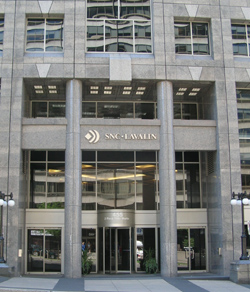Odious Debt
Who pays for "aid"?

SNC-Lavalin headquarters in Montreal: Canada's tax/aid/loan dollars at work. Ultimately, Haiti's poor will pick up the tab.
The "international community" has promised to give $2 billion to the illegal Latortue government. What is less often said is that around a billion of that is actually going to be loans, that Haiti will have to repay. "They're making decisions to further put Haiti into debt, for generations to come," said Jean Saint-Vil of the Haitian Lawyers Leadership Network.
Historically, Haiti has been crippled by debt. Powerful countries of North America and Europe have, through the International Monetary Fund, leveraged this debilitating debt to exercise control over Haiti's thoroughly colonized economy.
During the bloody and oppressive years of the Duvalier dictatorships, aid and loans flowed freely from the US and other rich countries which were eager to support a regime that represented their interests, regardless of the human costs. Today, nearly half of Haiti's debt dates from the Duvalier years, when the people of Haiti had very little say in matters of government (The US State Department, by contrast, had a very large say indeed.)
One IMF-imposed policy forced Haiti to lower its tariff on imported rice from 30 per cent to three per cent (the lowest in the hemisphere). This, when 70 per cent of Haitians earned their living as peasant farmers. When cheap, subsidized US rice flooded the market, thousands of farmers went out of business, Haiti's ability to feed itself diminished, and malnutrition rates went up, setting the stage for the current crisis.
Today, it is Haiti's poor majority who pays for the elite minority's earlier fiscal extravagance. Debt -- ahem, aid -- in other words, is a fancy way (among others) to transfer wealth from the majority to the minority.
Little has changed. Very little of Canadian "aid" and loans are spent on things that make the lives of Haitians better. Instead, they are spent on expensive infrastructure projects that will economically benefit the elite, who have plenty of money to pay for such things. Not surprisingly, these lucrative contracts are going to companies like SNC Lavalin, which also supplies millions of bullets to US occupation forces in Iraq.
Debt has been a tool of colonial powers since Haiti first gained its independence, 201 years ago. In exchange for allowing it access to international markets, France forced Haiti to pay for the "property" it had lost--the recently freed slaves. Aristide raised the ire of France (as well as the possibility that other colonies that have suffered might ask for some of their stolen money back) when he began a campaign to compel France to repay the money it extorted--an estimated $20 billion in 2005 dollars. One of the post-coup regime's first acts was to cancel this demand.
This context has led many to point out the obvious: that justice, rather than aid, is what Haiti needs. The case continues to be made for the cancellation of debts run up by US-supported dictators. The rationale is simple: creditors can loan money to unaccountable, murderous autocrats, but they should not be able to extract payment on these loans from their victims.
